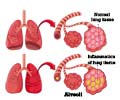Researchers have deciphered a mechanism by which specific intestinal microbiota amplify inflammatory reactions in the lungs. The study is published in the journal Cell.

‘The findings of the research could accelerate the development of new therapies for common diseases.’





Candida albicans stimulates the immune system to produce specific defense cells, so-called Th17 cells. However, some of these Th17 cells then attack other fungi, such as Aspergillus fumigatus. This phenomenon is called cross-reactivity. The research showed that immune-compromised individuals have an increased level of cross-reactive Th17 cells in their lung tissue. This concentration is associated with a deterioration of these patients' health. The protective Th17 reaction in the intestine seems to amplify pathogenic immune processes in the lungs. 'With this observation, we were able to show for the first time how a single member of the microbiome, Candida albicans, influences the specific immune response to a large group of other microbes. Immune cross-reactivity is probably a common mechanism by which the microbiome manipulates the immune system - with both protective and harmful effects', Cornely remarked.
Deciphering such specific effects of individual microbes will in future contribute to the development of targeted therapies.
Source-Eurekalert













